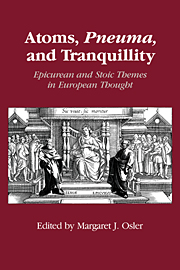Book contents
- Frontmatter
- Contents
- List of contributors
- Acknowledgments
- Introduction
- 1 Ethics and logic in Stoicism
- 2 Medieval connectives, Hellenistic connections: the strange case of propositional logic
- 3 Stoic psychotherapy in the Middle Ages and Renaissance: Petrarch's De remediis
- 4 Alonso de Cartagena and John Calvin as interpreters of Seneca's De clementia
- 5 The Epicurean in Lorenzo Valla's On Pleasure
- 6 Seneca's role in popularizing Epicurus in the sixteenth century
- 7 Stoic contributions to early modern science
- 8 Fortune, fate, and divination: Gassendi's voluntarist theology and the baptism of Epicureanism
- 9 Epicureanism and the creation of a privatist ethic in early seventeenth-century France
- 10 Robert Boyle on Epicurean atheism and atomism
- 11 Stoic and Epicurean doctrines in Newton's system of the world
- 12 Locke, Willis, and the seventeenth-century Epicurean soul
- 13 The Epicurean new way of ideas: Gassendi, Locke, and Berkeley
- 14 The Stoic legacy in the early Scottish Enlightenment
- Index
1 - Ethics and logic in Stoicism
Published online by Cambridge University Press: 13 November 2009
- Frontmatter
- Contents
- List of contributors
- Acknowledgments
- Introduction
- 1 Ethics and logic in Stoicism
- 2 Medieval connectives, Hellenistic connections: the strange case of propositional logic
- 3 Stoic psychotherapy in the Middle Ages and Renaissance: Petrarch's De remediis
- 4 Alonso de Cartagena and John Calvin as interpreters of Seneca's De clementia
- 5 The Epicurean in Lorenzo Valla's On Pleasure
- 6 Seneca's role in popularizing Epicurus in the sixteenth century
- 7 Stoic contributions to early modern science
- 8 Fortune, fate, and divination: Gassendi's voluntarist theology and the baptism of Epicureanism
- 9 Epicureanism and the creation of a privatist ethic in early seventeenth-century France
- 10 Robert Boyle on Epicurean atheism and atomism
- 11 Stoic and Epicurean doctrines in Newton's system of the world
- 12 Locke, Willis, and the seventeenth-century Epicurean soul
- 13 The Epicurean new way of ideas: Gassendi, Locke, and Berkeley
- 14 The Stoic legacy in the early Scottish Enlightenment
- Index
Summary
The Stoics were firmly convinced that philosophy possesses an organic unity, comparable to the coherence of a living being. They acknowledged that various disciplines may be distinguished within philosophy. Zeno of Citium, founder of the Stoic school, mentions three parts of philosophy – logic, physics, and ethics – all of which belong to the organic whole. Logic is not an autonomous discipline, independent of physics and ethics, for it constantly refers to these other branches. Dealing with human thinking, logic is mainly concerned with protecting the mind from error. This goal, however, could not be achieved without some ethical conditions. Only a wise man is free from error and falsity: His thinking is not jeopardized by irrational impulses, for he has suppressed and extirpated all irrational movements and inclinations. Thus he is guarded against emotional influences which might prevent him from attaining the truth. The activity of the mind, therefore, is clearly related to moral behavior: A man who is dominated by irrational inclinations must inevitably go astray in the search for truth. Conversely, ethics is closely related to logic. Moral behavior is essentially a life in conformity with reason, Logos. It is the proper function of logic to disclose the true nature of reason and its activity. Logic tries to clarify fundamental notions such as knowledge, perception and understanding, judging and arguing, truth and error. Clarification of the notion of reason is important for understanding moral behavior.
Finally, physics is related to both logic and ethics. For Zeno, the three parts of philosophy may be distinguished but they cannot be separated, since they constantly refer to each other. Each part loses its meaning if separated from the others.
- Type
- Chapter
- Information
- Atoms, Pneuma, and TranquillityEpicurean and Stoic Themes in European Thought, pp. 11 - 24Publisher: Cambridge University PressPrint publication year: 1991
- 2
- Cited by



